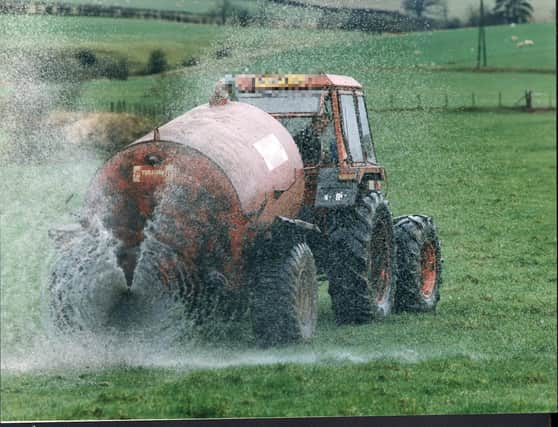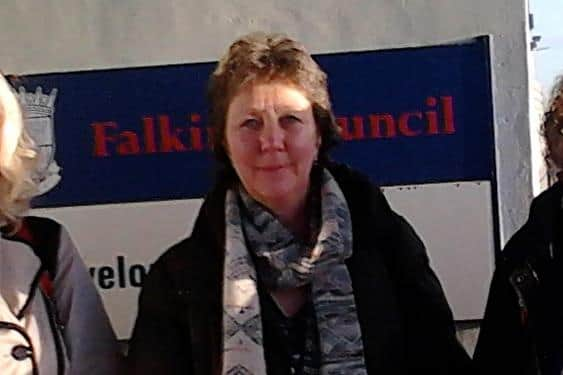Complaints as sewage sludge spread over fields near Lathallan roundabout


In recent weeks, strong smells coming from fields near Lathallan roundabout, prompted several complaints to Falkirk Council.
Scottish Water confirmed that sewage sludge was being spread - but denied it was the cause of the stench, saying that a local farmer had been spreading animal slurry the same day.
Advertisement
Hide AdAdvertisement
Hide AdIt also insist that any sewage sludge that is used as fertiliser on fields has been fully treated and is completely safe - indeed it is a valuable source of nutrients for soil.


But members of Avonbridge and Standburn Community Council (ASCC) - who have campaigned against the use of sewage sludge for years - don't accept the explanation.
And the incident has prompted them to take their concerns to new Falkirk East MSP Michelle Thomson.
It is not just the smell they find unacceptable - they have serious concerns about its safety when used a fertiliser, despite reassurances from the Scottish Government and Scottish Water.
Advertisement
Hide AdAdvertisement
Hide AdAfter the most recent incident, in an open letter, Jo Hird, of ASCC said: "We have grave concerns the practice of sewage spreading is impacting on both human and animal health and the contractors involved in the industry are unscrupulous and exhibit flagrant disregard for legislation and guidelines.


Her colleague Doreen Goldie added: "The use of this material is well documented as to the toxicity of it - its harmful effects both human and animals and affects air and water.
"It's an environmental disgrace and it should be stopped."
They say there is mounting scientific evidence that the sludge contains contaminants.
Mrs Hird explained: "In 2012 at the British Science Festival, held in Aberdeen, scientists reported environmental endocrine disruptors, present in sewage sludge, are man-made chemicals that have been shown to have adverse effects on animal and human health and fertility.
Advertisement
Hide AdAdvertisement
Hide Ad"One scientist, Dr Stewart Rhind, said that the effects on ecosystems and human health could be as significant as climate change."
Most recently, they point to a study carried out at Stirling University which warned ‘the potential spread of COVID-19 via sewage “must not be neglected” in the battle to protect human health’.
One of their major complaints is the fact that there is no one authority with over all responsibility for sewage sludge.
This means that complaints about spreading are passed between SEPA - which is responsible for storage of sewage sludge - and Falkirk Council, which is responsible for any odours that cause problems.
Advertisement
Hide AdAdvertisement
Hide AdMrs Hird said: "After the latest sewage spreading incident in Polmont, when numerous residents complained, the advice from SEPA was to contact Falkirk Council and the advice from Falkirk Council was to contact SEPA or Scottish Water.
"No-one will take responsibility and act!"
In February 2016, the Scottish Government published A Sludge Review: Final Recommendations.
The community council responded, saying the proposals were inadequate.
But, five years on, even the improvements that were suggested have never been implemented - in particular, there is still no one single authority with oversight for the whole process.
Advertisement
Hide AdAdvertisement
Hide AdA Scottish Government spokesperson said that there had been delays in implementing the recommendations due to Brexit and then the coronavirus pandemic.
They said: “The Scottish Government undertook a review of spreading sewage sludge to land, which resulted in a number of recommendations to help protect human health and the environment.
"We intend to take these recommendations forward through the Integrated Authorisation Framework regulations.
"These regulations were put on hold as a result of the urgent need to respond to EU Exit and the COVID-19 pandemic.
Advertisement
Hide AdAdvertisement
Hide Ad"We hope to return to these regulations, and the specific recommendations relating to sewage sludge, in the near future.
"Until then, farmers should adhere to the statutory requirements within the Sludge (Use in Agriculture) Regulations 1989 when using sewage sludge.”
The campaigners say that isn't good enough.
Another independent report, submitted to the Scottish Government in 2017, has never been published.
Mrs Hird said: "Brexit and the Covid 19 pandemic are being used as an excuse for inept complacency on the part of the Scottish Government.
Advertisement
Hide AdAdvertisement
Hide Ad"We implore it to stop relying on outdated legislation, to stop making excuses and to stop issuing ineffective platitudes."
She and Mrs Goldie have now met with their new MP, Michelle Thomson, asking her to take up the cause.
In particular, they want her to look at new "credible information" they have been given detailing health and safety failings among some contractors.
They believe the issue needs to be treated with more urgency.
Advertisement
Hide AdAdvertisement
Hide AdScottish Water insists that sewage sludge is safe and fully regulated and provides rich organic matter which slowly releases nitrogen and phosphorous.
A spokesperson said: "The material is fully treated to ensure it is safe and is not applied to agriculture until compliant material parameters are met.
"SEPA regulate all sludge spreading and Scottish Water follows the Sludge use in Agriculture Regulations, The Safe Sludge Matrix and the Biosolids Assurance Scheme.
"If this process was not used we would lose a valuable resource of nutrients for agricultural land.
Advertisement
Hide AdAdvertisement
Hide AdThey added: “We take any odour concerns from the surrounding area where sludge is used very seriously and if and when there are any complaints we will look to see what can be done to mitigate any odour concerns in the event any future agreements are reached for the use of any further fertiliser in the same area."
Thank you for reading this article on our free-to-read website. We're more reliant on your support than ever as the shift in consumer habits brought about by Coronavirus impacts our advertisers.
